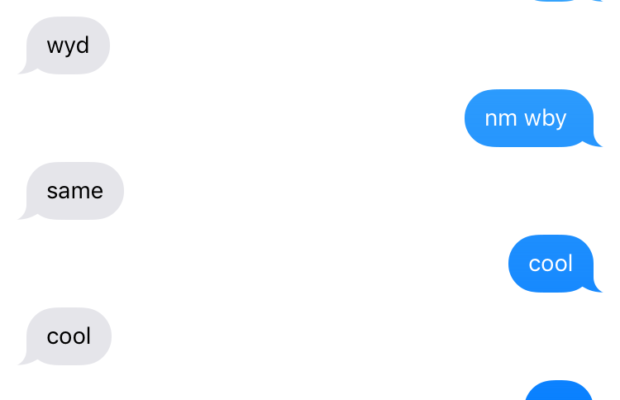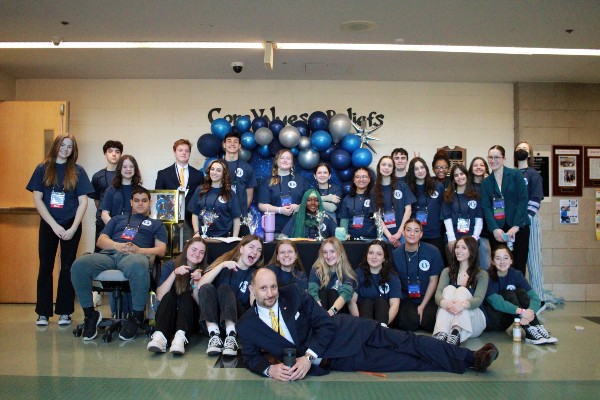“They’re talking”
“What does that mean?”
High school students have their own vernacular. However, more often than generating new words, they simply settle for changing the definitions of words that already exist.
Common words make their way into the high school vernacular, ending up with altered meanings. For instance, “lit” is no longer the past tense of light, “shipping” isn’t an activity reserved for UPS, “bet” does not mean to gamble, GOAT is not an animal but rather shorthand for Greatest of All Time, calling someone “bad” means good? And talking, well, it could mean a lot.
Two people are Snapchatting, fitting small flirtations within the text bar limit? They’re talking.
Two people are texting each other at all hours of the day? They’re talking.
Two people are hanging out everyday? They’re talking.
These behaviors are definite signs people are “talking,” but there are more ambiguous signs that don’t exactly confirm people are talking, but certainly plant the seeds of thought in everyone’s head.
A flirtatious comment on an Instagram, either complimenting one’s appearance or jokingly bashing it? Eyebrows raise.
Multiple appearances on each other’s Snapchat stories? Eyebrows raise.
A picture posted of two, with a seemingly innocuous caption, such as “He’s okay, I guess,” accompanied by a blushing emoji? It all but confirms two people are indeed talking.
Initially, I thought the confusion about “talking” was about what the word meant.
So, I collected interviews from a variety of high school demographics, ranging from freshmen boys to senior girls, asking what they thought talking meant.
However, there was a clear consensus to all these interviews- talking is defined as the stage before a relationship, when people are seemingly getting to know each other before commencing a relationship.
Many students listed the behaviors above, such as texting, Snapchatting, walking in the halls together, as signs people were talking.
Quickly, it became evident that the confusion surrounding the term “talking” does not lie in the definition of the word, but rather the expectation of what the “talking” will result in.
Many students, such as alumnus Ian Romanski, have experienced situations in which two people who are talking are not at all on the same page.
“For me, personally, when I’ve been ‘talking’ to people, one person can have a certain expectation and for the other person it’s completely platonic,” explained Romanski, “the other person may have a love interest, someone could have no interest, but there’s no clarification.”
Here’s my theory on talking:
We’re the generation of uncertainty, of being able to change anything at any time. When we register for courses, we have the option to change once we go online.
Or we can change over the summer.
Or drop out within the first two weeks.
It’s hard for us to accept that any decision is final. In everything we do, we are given a plethora of possible choices, as well as the option to change our minds with no repercussions.
When we open Netflix, there are upwards of nine thousand options presented. We can switch from series to series with ease.
Zappos literally allows you to return shoes up to a year later (and provides the shipping fee).
And so, we try to apply the same flexibility, the same ability to switch whenever we feel like it, to relationships. However, as it became apparent over the course of an abundance of interviews, calling it “talking” doesn’t mean feelings won’t get hurt.
People do not have return policies as painless as Zappos.
In fact, an argument can be made that defining a relationship as “talking” increases the ways a person could be hurt.
Calling the relationship “talking” rids people of the obligation of formally letting a person know when you no longer want to interact with them. Of course, the morally correct thing to do is to alert a person when you plan on not speaking to them anymore.
However, the morally correct thing to do is not a requirement in this scenario.
The phrase “ghosting” has been coined to describe one of the many, many ways “talking” can end badly.
Ghosting
In this phenomenon, one of the parties, after independently deciding they are done “talking”, will simply stop responding. This disappearing act is dubbed as “ghosting” because of the way the person becomes seemingly invisible, much like a ghost, leaving only read receipts and opened (and unanswered Snapchats) as evidence they still exist.
Spooky.
There are alternate ways that talking ends that are far more confrontational than the ghosting method.
Grapevine
The Grapevine is when the “talking” ceases because of rumors. A great variety of rumors reportedly ended several Woodland students “talking” (which is surprising, right? Rumors, in a high school?)
For instance, hearing that someone hooked up with someone else while they were “talking” is a rumor that has terminated many almost-relationships. Whether the information is a faulty account from a friend of a friend who maybe saw something at a party, or completely truthful, it can cause the same amount of damage.
This is because, often, information is not checked.
As put by Barreira, “a guy or girl gets mad and hurt without even talking to them about it, they jump to conclusions.”
Some rumors are more based on reputation. If someone begins to talk to someone who has a reputation as a player or heart breaker, several people tend to warn the person in advance. To some, these warnings have a lot of weight, particularly if the warnings are coming from someone who previously “talked to” or dated the person in question.
Additionally, if a friend is the one who previously “talked” to or dated the person, a myriad of other concerns come into play.
Friends
When asked if it is okay to talk to somebody a friend has previously “talked to”, there were mixed answers.
“It depends if they talked for two weeks and it wasn’t a big deal and your friend says it’s fine, but if they were about to date and then something happened and your friend got hurt, then no,” explains Kyla Drewry, “there’s different stages so there’s no definite answer.”
Anthony Barreira has a more straight-forward approach.
“I would just go for it. I’m not here to please other people, I don’t care what other people think. If he’s not over her, then no, but if he is, I think it’s okay,” said Barreira.
Friends Part 2
Friendship can complicate the talking process in more ways.
“Let’s say you’re talking to someone you’re close with and you realize you just want to be friends because you don’t want to ruin the friendship,” explains a student who wishes to remain nameless,” then you might end up hurting their feelings and now they don’t even see you as a friend anymore.”
On a brighter note, some agree that friendship can actually make the process easier. Since the purpose of “talking” is to get to know somebody better before committing to a relationship, people who are already friends can forgo this process.
Slow Your Roll
Another cause of “talking” turning into silence is when one of the parties is trying to accelerate the relationship, by either physical or emotional means, and the other party does not feel comfortable.
Slow Your Roll (Emotionally)
Basically, if someone says “I love you” and the other person is not ready (or even anything close to ready) to reciprocate that, things unravel.
Slow Your Roll (Physically)
When one person’s actions or words are deemed inappropriate (or even invasive) by the other party, things come to halt.
Fizzled Out
This is the most common and least dramatic scenario. Two people, although initially attracted to each other, realize after talking for a little while that they actually do not have anything to talk about.
Communication is slowly stopped, but neither party is opposed to it.
Perpetual “talking”
“Talking” usually lasts anywhere from two weeks to three months before it either escalates to a full-blown relationship or blows up (usually from one of the reasons above).
When one party is ready for the “talking” stage to end, but another party insists on keeping the relationship in that phase, it creates a messy situation.
Usually, this creates a long, drawn-out process of one party waiting for the other party to be ready to date, eventually getting annoyed with the waiting, and breaking things off.
The Gist
After discussions with various students, after delving into all the possible ways “talking” can end, an important theme was discovered. The main culprit of flirtations turning sour is not ghosting, not the grapevine, but something much more simple: miscommunication.
So next time you think you’re conversing with someone, be careful. They might think you’re talking.
Tina is the Executive Social Media Director, and in charge of managing Hawk Headlines. She has spent three full semesters here, and is heavily involved with theater. Tina describes herself as a "pop culture aficionado".

























